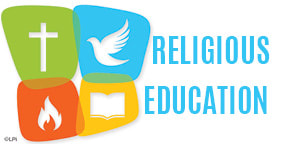Religious Education and Catechesis

All the Christian faithful, since they are called by baptism to lead a life in keeping with the teaching of the gospel, have the right to a Christian education by which they are to be instructed properly to strive for the maturity of the human person and at the same time to know and live the mystery of salvation. Parents, since they have given life to their children, have a most grave obligation and possess the right to educate them. Therefore, it is for Christian parents particularly to take care of the Christian education of their children according to the doctrine handed on by the Church.
The duty and right of educating belongs in a special way to the Church, to which has been divinely entrusted the mission of assisting persons so that they are able to reach the fullness of the Christian life. Since true education must strive for complete formation of the human person that looks to his or her final end as well as to the common good of societies, children and youth are to be nurtured in such a way that they are able to develop their physical, moral, and intellectual talents harmoniously, acquire a more perfect sense of responsibility and right use of freedom, and are formed to participate actively in social life. In each parish, the pastor has particular care for the Catholic education of children and youth. Pastors have the duty of arranging everything so that all the faithful have a Catholic education.
The parish community continues to be the prime mover and preëminent place for catechesis. The vocation of the parish is to be a fraternal and welcoming family home, where those who have been baptized and confirmed become aware of forming the People of God. In that home, the bread of good doctrine and the Eucharistic Bread are broken for them in abundance, in the setting of the one act of worship; from that home they are sent out day by day to their apostolic mission in all the centers of activity of the life of the world.
The duty and right of educating belongs in a special way to the Church, to which has been divinely entrusted the mission of assisting persons so that they are able to reach the fullness of the Christian life. Since true education must strive for complete formation of the human person that looks to his or her final end as well as to the common good of societies, children and youth are to be nurtured in such a way that they are able to develop their physical, moral, and intellectual talents harmoniously, acquire a more perfect sense of responsibility and right use of freedom, and are formed to participate actively in social life. In each parish, the pastor has particular care for the Catholic education of children and youth. Pastors have the duty of arranging everything so that all the faithful have a Catholic education.
The parish community continues to be the prime mover and preëminent place for catechesis. The vocation of the parish is to be a fraternal and welcoming family home, where those who have been baptized and confirmed become aware of forming the People of God. In that home, the bread of good doctrine and the Eucharistic Bread are broken for them in abundance, in the setting of the one act of worship; from that home they are sent out day by day to their apostolic mission in all the centers of activity of the life of the world.
Religious Education Notes
- Parents must be parish members, complete the registration form, and pay the fee on or before the first night of classes.
- Classes for High School (9-12) are held once a month on Wednesday from 6:00-8:00 pm.
- Classes for grades 1-8 are held roughly two to three times a month from 6:00–7:15 pm.
- First Class begins on Wednesday, September 6, 2023, at 6:00 pm in Church.
- If you have questions call the RE office at 715-423-1251 or email at [email protected].
Parent Participation
Please email or call me to let me know which area you would like to volunteer. (All adults in a classroom including visiting parents must have completed the Safe Environment Requirements)
- Catechist (Teacher) - for the 2023-2024 school year tuition fee for one child will be waived.
- Co-Catechist - Willing to teach with another adult (2023-2024 school year tuition fee for one child will be waived).
- Catechist Aide- Assists in classroom
- Substitute Catechist